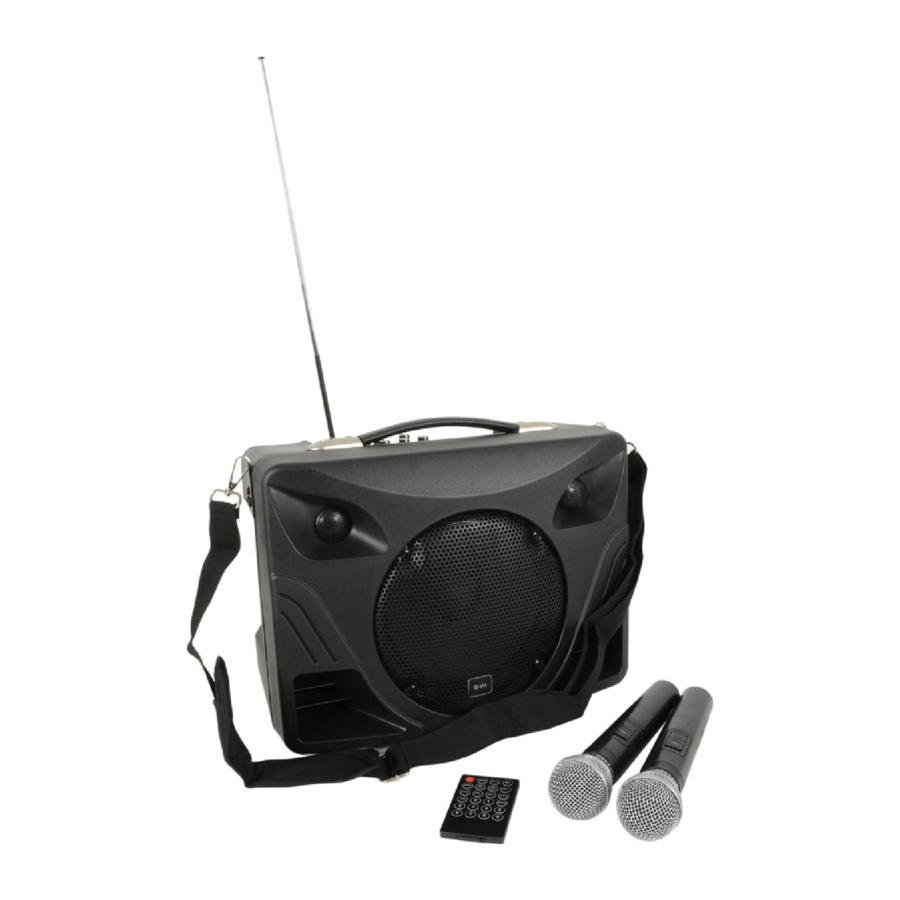Avsl QTX DELTA-200 Manuel de l'utilisateur - Page 5
Parcourez en ligne ou téléchargez le pdf Manuel de l'utilisateur pour {nom_de_la_catégorie} Avsl QTX DELTA-200. Avsl QTX DELTA-200 8 pages. Performance pa with bluetooth

Additional Inputs
In addition to the unit's own wireless UHF microphones, a MIC/LINE IN combo XLR/jack input (32) is provided to connect
an external microphone or line input. A MIC/LINE switch (33) sets the input sensitivity to suit which type of input is used.
On the top panel, a VCV switch (16) activates the Voice Controlled Volume feature when pressed in.
This function gives priority to microphones over playback, so that announcements are more easily heard
When the VCV is on, any sound through the UHF microphones or Mic/Line input will cause the playback to be muted.
The music volume is restored after there is no sound through the UHF or mic/line input after a short time.
Alongside the VCV switch is a 3.5mm AUX stereo jack input (15), which may be used to connect a smart phone or mp3
player for playback of audio tracks. This input is played through the media player, selected via the MODE button.
A further input is provided for connecting an electronic KEYBOARD or DRUMKIT via 6.3mm jack (18). This can instead be
used simply as a LINE input (e.g. CD, radio tuner, mp3 player) via the L+R RCA sockets (17) or 3.5mm jack (19).
This input is shared by all three input types and is governed by a single VOLUME control (20).
Alongside the KEYBOARD / DRUMKIT / LINE VOLUME control is an OUT/REC 3.5mm jack line output (21), which can be
used to connect onto a recorder or further amplifier, carrying a mix of all inputs heard through the DELTA-200 speaker.
Delay Effect
The DELTA-200 is equipped with an internal digital delay effect unit for microphones and instrument inputs to share.
There are separate EFFECT level controls on each input channel that control how much signal is fed to the delay section.
The overall delay effect level to the output is determined by the EFF LEVEL control (24). MIN = off, MAX = full output.
The DELAY control (22) changes the time between echo repeats. MIN = short slap-back echo, MAX = long delay.
The REPEAT control (23) varies the number of regenerated repeats. MIN = single repeat, MAX = many fading repeats.
Internal Media Player
The DELTA-200 onboard media player can play audio from USB/SD media, FM radio, AUX input or a Bluetooth device.
Any audio source from the media player is governed by the media player VOLUME control (8).
The media player also has dedicated TREBLE (6) and BASS (7) EQ controls to adjust the tone character.
The 12 o'clock position is the neutral, unaffected setting.
Turn the TREBLE control anticlockwise to cut high frequencies or clockwise to boost high frequencies.
Turn the BASS control anticlockwise to cut low frequencies or clockwise to boost low frequencies.
The backlit LCD display (4) has a row of controls beneath it for control of playback sources (2)
MODE
switches input between USB/SD media, FM radio, AUX input or Bluetooth
EQ
steps through the equalization profiles: POP / ROCK / CLASSIC / EQ OFF
press for previous track, hold for fast-reverse search
press for next track, hold for fast-forward search
Repeat mode – RPT ONE = repeat current track, RPT ALL = repeat all tracks
Play/Pause playback or scan FM radio stations
To play mp3, wma or wav files stored on a USB pen drive or SD card, insert the USB memory stick (1) or an SD card (3)
into the relevant slot on the top panel. Playback will start automatically from the last media inserted (USB or SD).
If playback does not start, press the MODE or
During USB or SD playback, pressing the
Pressing the
will pause or play the current track.
Press the EQ control to step through POP, ROCK or CLASSIC tonal profiles or select "EQ OFF" for the unaffected option.
To repeat the current track, press the
button or try removing and re-inserting the memory device.
and
buttons will navigate tracks in the folder on the sending device.
button so that the display shows "RPT ONE". Otherwise, select "RPT ALL"
178.812UK User Manual
